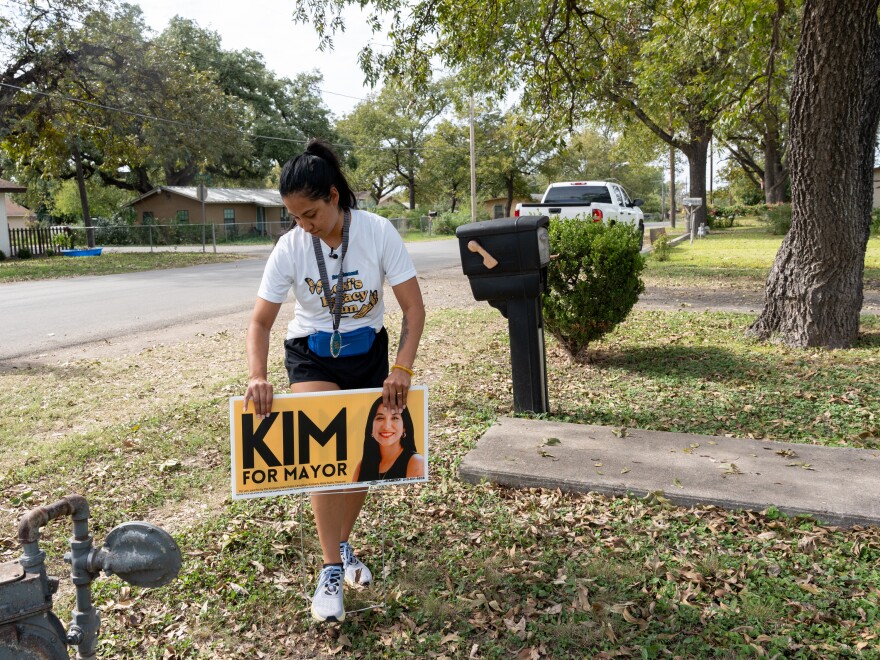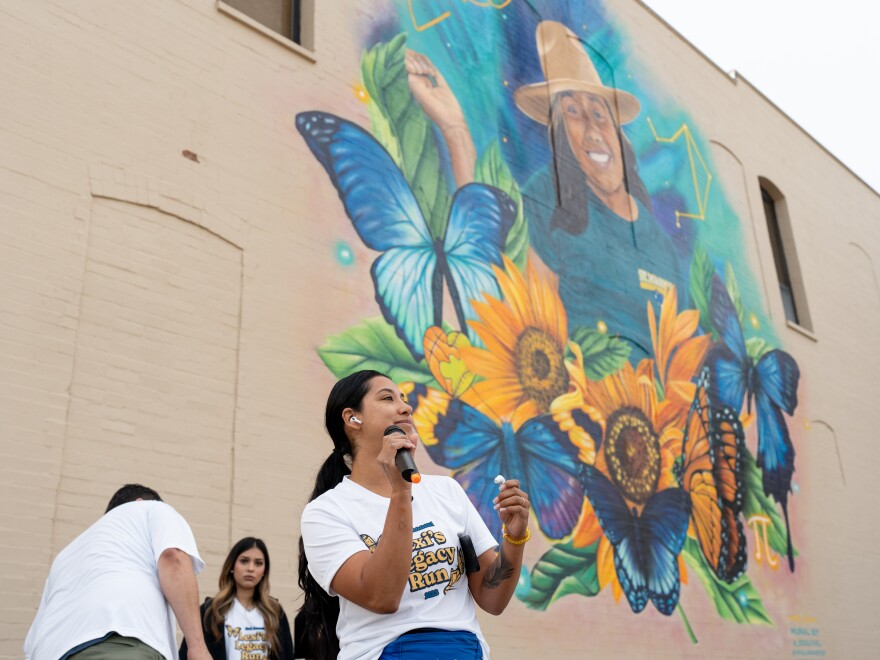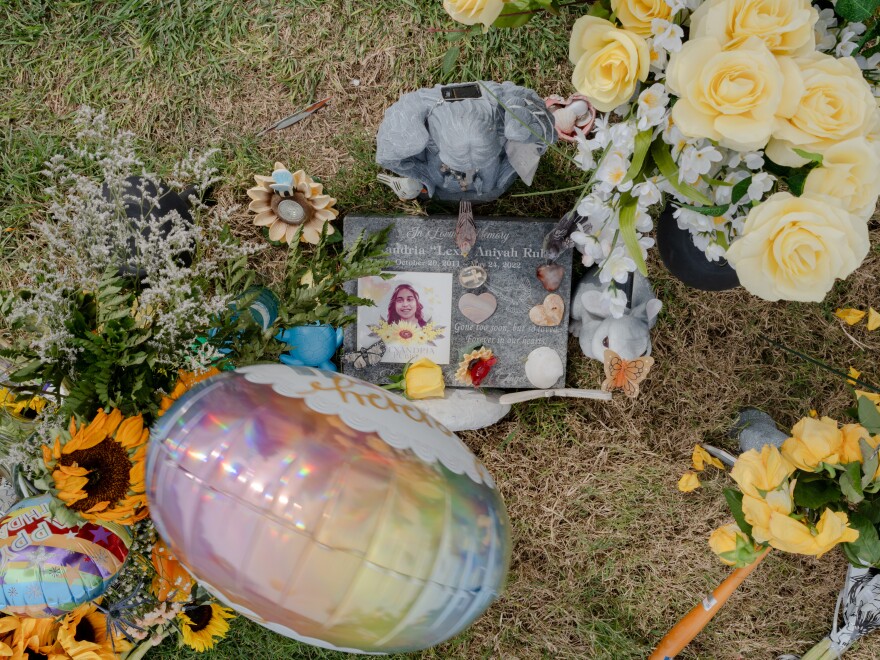It's a warm Saturday afternoon in Uvalde, Texas, and Kimberly Mata-Rubio is zigzagging between houses on Garden Street – knocking on doors and talking to voters.
She is wearing a medal around her neck from a race she ran earlier that morning to honor her daughter, Lexi – the day before would have been her 12th birthday.
Lexi was among the 19 students and two teachers killed in a mass shooting at her school in May 2022. In the months since, Mata-Rubio and her husband Felix have traveled the country demanding stricter gun control laws. Mata-Rubio says her job now is to honor Lexi's life with action.
"I know she would have made a difference in this world if she'd been given the opportunity. So I want to do that for her," she told NPR.
Mata-Rubio is hoping to make that difference by running for mayor of Uvalde in a special election on Tuesday. Yet as she hits the campaign trail, some residents see her as a painful reminder of a tragedy they're trying to move on from.
'I carry empathy'
For Mata-Rubio, turning grief into action is not just about her family. She says everyone lost something that day in May.
"My community is also suffering," she said. "We lost our sense of security. We lost 21 residents of Uvalde. And I want to be part of the change that my community sees."

Not everyone wants that kind of change. Talking to people in the town of 15,000 reveals a divided community with clashing ideas on how to move forward. Some would rather not have permanent reminders in town, such as the 21 white crosses that line the plaza's fountain.
More than five months after the massacre, Uvalde County voted to reelect Republican Gov. Greg Abbott despite his opponent, Beto O'Rourke, campaigning for stricter gun measures. Only 45% of eligible Uvalde County voters cast a ballot in that election, according to the Texas Secretary of State's office.
The tragedy didn't make much of a difference with new voters either – there have been fewer than 200 new voter registrations in the county since the shooting.
Aide Escamilla, who works at the local junior college, says the lack of voter participation is apathy.
"The massacre didn't change a thing," she said. "And I don't think that this mayoral race is going to reflect anything different in our community."

Some Uvalde residents told NPR they don't want to be remembered as the town with the mass shooting.
"I carry empathy that others don't, I lost my daughter," Mata-Rubio said of what sets her leadership apart from the other candidates. "But I also understand the other side, and I also understand that there's this need to move forward because you don't want to stay in this heaviness, this pain."
The other candidates
When the current mayor, Don McLaughlin, announced he was stepping down to pursue another political office, Mata-Rubio texted her husband: "Should I run?"
"He said, 'You can do this. You're Lexi's mom,'" Mata-Rubio said.
That's all she needed to hear.
Mata-Rubio is up against two candidates: Cody Smith, a former local politician, and Veronica Martinez, an elementary school art teacher.
Smith, a senior vice president at First State Bank of Uvalde, spent more than a decade on the city council and was elected mayor in 2008. He was reelected in 2010. Smith declined to be interviewed for this story, but did issue a statement to NPR.
"As past mayor for four years, and city councilman for 13, I understand the leadership this position affords to not only unify and strengthen our community, but facilitate a wave of difference makers who can impact our citizens for generations," the statement read.
Some voters NPR spoke to say Smith is a familiar face. They feel they know what to expect from his leadership, whereas many don't know the other two candidates.

Martinez is a newer face, and is hoping to make the council more accessible for residents. She's been to city meetings and says they need to be more collaborative.
"Communication is a big issue and it's time to communicate with each other. It's time to be heard," she told NPR.
Martinez is also hoping to be the person that helps the community heal.
"We need somebody who's going to be able to nurture the community in the right direction," she said. "Someone who's going to be able to handle those negative comments or is going to be able to address those negative issues without being, I guess, biased."
Lexi's legacy
Two weeks after a gunman stormed into their daughter's school, the Rubios pleaded with members of Congress to enact stricter gun control laws.
"We understand for some reason, to some people, to people with money, to people who fund political campaigns, that guns are more important than children," Mata-Rubio said at the time.
Along with other family members who lost their loved ones, the couple has spent the last year and a half advocating for gun reform. First, they wanted a complete ban on assault weapons at the federal level. When that didn't pass, they focused on the state level – raising the age from 18 to 21. That also failed.

Ronna Milo Haglili, a psychologist who studies the link between trauma and activism, says fighting for change can help with the healing process.
"When trauma happens, it's really shattering our sense of meaning and purpose," Milo Haglili told NPR. "Many of them might say, 'I didn't choose that. I just have to do that.' But it's still something that they feel compelled to do ... and that provides a sense of empowerment."
In July, Mata-Rubio launched her campaign to become Uvalde's mayor. Soon after, she started knocking on doors and passing out yard signs in bright yellow, Lexi's favorite color.
Yet while her name has been in the national media, not everyone in the town knows who she is.
Back on the trail on the recent warm Saturday, she runs into Joel Alvarado. He says he has seen her name, but doesn't know much about her. Mata-Rubio introduces herself and tells him she covered the city council when she was a reporter for the Uvalde Leader News. Now, she says, she's fighting for accountability and transparency, and wants to hear from residents about the issues concerning them.

In almost every interaction Mata-Rubio has with people, there's a mention of Robb Elementary, and of Lexi.
Alvarado interjects and notices Mata-Rubio's tattoos — of Lexi's name, face and drawings.
"I don't think we can move forward unless we have the answers that everybody in this community deserves," Mata-Rubio later said. "What went wrong that day and how do we make sure it never happens again."
And for Mata-Rubio, that means convincing people of Uvalde that she is the right person that can help her town heal – not despite her grief, but because of it.
Juana Summers contributed to this report. contributed to this story
Copyright 2023 NPR. To see more, visit https://www.npr.org.


